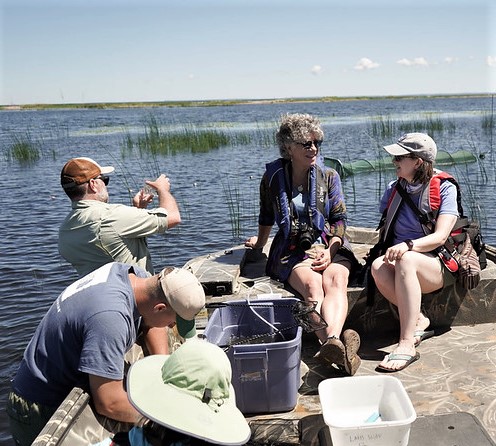Wisconsin Sea Grant says ‘Bon Voyage!’ to a communications legend
This spring Wisconsin Sea Grant is sending off Senior Science Communicator Marie Zhuikov to a much-deserved retirement.

This spring Wisconsin Sea Grant is sending off Senior Science Communicator Marie Zhuikov to a much-deserved retirement.
As part of an ongoing series, a summer research scholar reflects on wild rice research.
Intern Emma Kraco has teamed up this summer with Sharon Moen, Eat Wisconsin Fish outreach specialist, to help support Wisconsin food-fish producers.
UW Water Science-Policy Fellows Misbah Husain and Sarah Martinez examined water issues through a legal lens–appropriate for two recent law school graduates.
On Feb. 9, River Talks featured Mark Loomis, project manager for the Legacy Act Project at Spirit Lake on the St. Louis River in Duluth. Loomis presented an update, providing images and information on the remediation project’s status.
Three websites can help you find fish that is tasty, healthy and supports local and regional economies. This fish is caught by commercial fishers on the Great Lakes or raised sustainably by farmers.
The sixth annual Water@UW-Madison spring symposium took place on Friday, April 22. Providing an opportunity for water scholars and policymakers to reconnect around water, it was an inspirational way to spend Earth Day. More than 130 people joined the online community and it featured more than 15 speakers who reflected on water connections from the Read more about Keeping the positive water vibes alive-symposium recap[…]
Continuing our series of posts celebrating our 50th anniversary, we check with in Fisheries Specialist Titus Seilheimer to discusses how his field has changed over the years and how he hopes to see it progress.
Former Wisconsin Sea Grant extension agent Harvey Hoven worked out of the Superior field office. He was employed from 1989 through 2003 and focused on coastal businesses along the South Shore of Lake Superior, aquaculture in the Midwest and initial efforts to remediate the St. Louis River, the largest U.S. tributary into Lake Superior.
Continuing Wisconsin Sea Grant’s 50th anniversary blog series, communications student Eva Ryan interviewed Sharon Moen, the Eat Wisconsin Fish outreach specialist. They discussed the past, present and hopes for the future of producing fish in Wisconsin for local and global consumption.